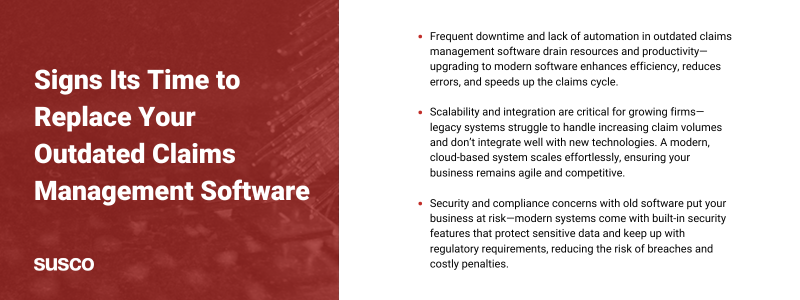
Keeping claims management software up to date is essential for insurance services firms striving to maintain efficiency and a competitive edge. As the insurance industry becomes increasingly data-driven, outdated software slows your business down and creates significant risks.
From frequent system crashes to integration issues, outdated software can hinder your team’s productivity, reduce customer satisfaction, and jeopardize compliance. If you’re experiencing recurring problems, it may be time to consider an upgrade.
Here are five clear signs that your current claims management system is no longer meeting your needs.
Frequent System Downtime and Technical Issues
Frequent crashes and system downtime disrupt your workflow and waste valuable resources. Every glitch, slow response time, or freeze leaves adjusters stuck waiting instead of processing claims. The impact extends beyond frustration—it costs your business money.
Inability to Integrate with New Technology
As technology evolves, integration with modern tools becomes essential. However, outdated systems struggle to connect with innovative solutions like AI-powered analytics or mobile apps. These disconnects result in data silos and extra manual work for your team.
Without seamless integration with platforms like XactAnalysis or Guidewire, you miss real-time data insights and efficiencies that could drive faster decision-making.
A modern claims management system integrates effortlessly, empowering your team with accurate, up-to-date information at their fingertips.
Lack of Automation Features
Manual processes slow your team down, increasing the risk of human error and dragging out the claims cycle. If adjusters still spend hours on repetitive tasks, your software is behind the curve.
Automation streamlines processes like assigning claims, generating reports, or scheduling inspections.
This shift not only speeds up claims processing but also improves accuracy. By freeing adjusters from routine tasks, automation allows them to focus on more complex, high-value work—boosting productivity and customer satisfaction.
Poor User Experience and Low Staff Adoption
An outdated, clunky interface frustrates your staff, leading to workarounds and a lack of enthusiasm for using the system.
If employees find the software tricky to navigate, they may revert to manual processes, which defeats the purpose of having claims management software in the first place.
Modern systems prioritize intuitive design, which leads to higher staff engagement. A user-friendly interface makes onboarding smoother, increases productivity, and encourages employees to take full advantage of the software’s capabilities.
Compliance and Security Concerns
Keeping up with regulatory changes and cybersecurity threats is critical, especially when handling sensitive client data. Outdated software exposes you to security vulnerabilities and compliance risks, which could result in costly breaches or penalties. Modern claims management systems include built-in security features like data encryption, multi-factor authentication, and automated compliance updates.
If you notice any of these signs, it’s time to consider replacing your outdated claims management software.
Scalability Issues with Legacy Systems
As your insurance services firm grows, so does the volume of claims, data, and client interactions. While growth is a positive indicator for your business, outdated claims management software might be unable to keep up.
Limited Capacity to Handle High Claim Volumes
Legacy systems often have limitations in processing large volumes of data efficiently. As your firm scales, you may encounter slow response times, system crashes, or extended loading times—which can significantly impact your ability to deliver timely service.
On the other hand, modern claims management software grows with your business. These systems use cloud-based infrastructure that dynamically adjusts to your needs, allowing you to handle higher volumes without sacrificing performance.
With cloud scalability, you can process more claims faster without being held back by the physical limitations of older, on-premises systems.
Inflexible Systems Stifle Growth
One of the most significant drawbacks of outdated software is its lack of flexibility. Legacy systems are often rigid, with hard-coded processes that make adding new features or scaling up capabilities challenging.
As your business grows or industry regulations change, you may find that your system can’t adapt quickly enough, resulting in costly workarounds or manual processes.
With a scalable, modular platform, these updates can be seamlessly implemented, keeping your operations agile and competitive.
Higher Costs Due to Inefficiencies
Operating on an outdated system becomes more expensive as your business grows. Legacy software requires frequent maintenance, consumes more IT resources, and often necessitates costly custom coding to extend its life.
These hidden costs can quickly add up, reducing your profitability. Worse, if your system fails to scale, you may face disruptions that cost even more in terms of lost productivity and client dissatisfaction.
Investing in scalable software designed for growth doesn’t just future-proof your business—it also optimizes costs. Instead of being bogged down with maintenance and patches, your IT team can focus on more strategic initiatives that drive business value.
Keeping Pace with Evolving Customer Expectations
As your firm grows, so do the expectations of your clients. They want faster claim processing, real-time updates, and seamless digital interactions. If your current system lacks the scalability to support these demands, your customer experience suffers.
Clinging to outdated claims management software might seem cost-effective in the short term, but it ultimately holds your business back in ways that impact your bottom line.
From system downtime to poor integration and security vulnerabilities, the signs that it’s time to upgrade are hard to ignore. Investing in a modern, scalable system doesn’t just enhance efficiency and empower your team; it improves customer satisfaction and secures your firm’s future growth.
Susco has solutions
Is your claims software holding you back? Contact Susco today for a free one-hour consultation to explore how we can help you upgrade to a modern, secure, and efficient claims management system.